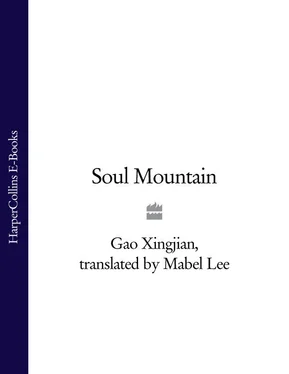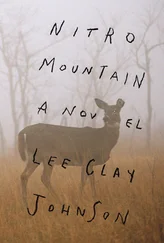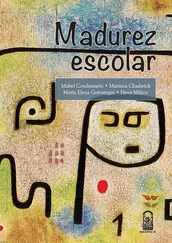SOUL
MOUNTAIN
GAO XINGJIAN
Translated from the Chinese by Mabel Lee

 Copyright
Copyright
This novel is entirely a work of fiction. The names, characters and incidents portrayed in it are the work of the authors imagination. Any resemblance to actual persons, living or dead, events or localities is entirely coincidental.
Fourth Estate
An imprint of HarperCollins Publishers Ltd. 1 London Bridge Street London SE1 9GF
www.harpercollins.co.uk
First published as Lingshan in Taiwan by Lianjing Chubanshe in 1990 First published in English by Flamingo (Australia) in 2000
Text copyright © Gao Xingjian 1990
English language translation copyright © Mabel Lee 2000
Gao Xingjian asserts the moral right to be identified as the author of this work
A catalogue record for this book is available from the British Library
All rights reserved under International and Pan-American Copyright Conventions. By payment of the required fees, you have been granted the non-exclusive, non-transferable right to access and read the text of this ebook on-screen. No part of this text may be reproduced, transmitted, down-loaded, decompiled, reverse engineered, or stored in or introduced into any information storage and retrieval system, in any form or by any means, whether electronic or mechanical, now known or hereinafter invented, without the express written permission of HarperCollins ebooks
HarperCollins Publishers has made every reasonable effort to ensure that any picture content and written content in this ebook has been included or removed in accordance with the contractual and technological constraints in operation at the time of publication
Source ISBN: 9780007119233
Ebook Edition © OCTOBER 2010 ISBN: 9780007385737
Version: 2018-10-09
From the international reviews for Soul Mountain:
‘Arguably [Gao’s] finest work… Soul Mountain is a quirky, thick, playful monster of a book, a bit like what one might expect if Beckett or Ionesco had traveled in China and been steeped in Chinese myths. It is not easy to say what the novel is about — and yet the marvel is that somehow it is still both engaging and elegant.’
New York Times
‘A rich soup of a book… One man’s personal and philosophical odyssey evolves against the dramatic and vibrantly physical background of Central China’s ancient forests. Part novel, part philosophical tract, the genius of Soul Mountain lies in its not attempting to offer any answers… It instead belongs to that curious genre of intellectual quest dominated by the great German writer WG Sebald. This search for self serves to set the book beyond cultures while also succeeding in presenting the Western reader with a wonderfully broad portrait of a country caught between the ancient and the modern in a most fundamental way.’
Irish Times
‘Gao’s flight to rural China to evade imprisonment inspired this dazzling autobiographical novel… Superficially, this epic picaresque resembles familiar western literary forms but its bedrock is utterly other.’
Guardian
‘An original voice unlike any contemporary writing available in English… Soul Mountain is an extraordinary product of an imagination infused with European and Chinese cultures; an exploration of individual identity in a society that exalts the collective; and a daring play with voice that plunders ancient Chinese myths, philosophy, history, folk songs and memory’
The Australian
Cover
Title Page
Copyright
Praise
Introduction
1
2
3
4
5
6
7
8
9
10
11
12
13
14
15
16
17
18
19
20
21
22
23
24
25
26
27
28
29
30
31
32
33
34
35
36
37
38
39
40
41
42
43
44
45
46
47
48
49
50
51
52
53
54
55
56
57
58
59
60
61
62
63
64
65
66
67
68
69
70
71
72
73
74
75
76
77
78
79
80
81
Keep Reading
Appendix
About the Author
About the Publisher
Gao Xingjian was born on 4 January 1940 in war-torn China soon after the beginning of the Japanese invasion. He completed secondary and tertiary studies in the People’s Republic of China (established in 1949 after the Communist victory in the civil war against the Nationalists), graduating with a major in French from the Beijing Foreign Languages Institute in 1962. Gao Xingjian came to national and international prominence as a writer and critic during the early 1980s for his experimental works of drama, fiction and theory that contravened the guidelines established by the ideologues of the Chinese Communist Party. At the time, China was just beginning to emerge from the throes of the Cultural Revolution (1966—1976), a decade during which the self of the individual was virtually annihilated from intellectual and creative activities. Basic human instincts, sensitivities, thinking, perceptions and judgements were repressed and stunted, and extreme forms of socialist-realist and romantic-revolutionary representations of reality became the compulsory basis of all creative endeavours: literature and the arts therefore became representations of a distorted reality.
The end of the Cultural Revolution and the implementation of considerably more liberal policies meant that Gao Xingjian was able to publish, despite continuing aftershocks from those times. It also meant that he was able to travel abroad as a member of two writers’ delegations — in 1979 to France, and in 1980 to Italy. From 1980 to 1987, he published short stories, novellas, critical essays and plays in various literary journals, as well as four books: A Preliminary Discussion of the Art of Modern Fiction (1981), a novella A Pigeon Called Red Beak (1985), Collected Plays of Gao Xingjian (1985), and In Search of a Modern Form of Dramatic Representation (1987). In addition, three of his plays were staged at the Beijing People’s Art Theatre: Absolute Signal (1982), Bus Stop (1983) and Wild Man (1985). However, events in Gao Xingjian’s life during those few years made him resolve to fully commit himself to the creative expression of his own reality, and no authority other than that of his self would again be allowed to dictate his judgements of that reality.
In 1987, when Gao Xingjian left China to take up a D.A.A.D fellowship in Germany, he did not intend to return. He had taken with him the most important thing in his life: the manuscript of a novel he had begun in Beijing in the summer of 1982. This novel was Lingshan which he subsequently completed in September 1989 in Paris (where he now resides and has French citizenship) and published in Taipei in 1990. Goran Malmqvist, whose translations of ten of Gao Xingjian’s plays were published as a set by the Swedish Royal Dramatic Theatre in 1994, published the Swedish version of the novel as Andarnas berg, in 1992; and Noël and Liliane Dutrait’s French version, La Montagne de l’âme, was published in 1995. For the English version, the title Soul Mountain has been used.
Читать дальше


 Copyright
Copyright










